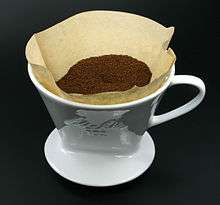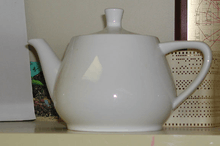Melitta
Melitta (/məˈliːtə/) is a German company selling coffee, paper coffee filters, and coffee makers, part of the Melitta Group, which has branches in other countries. The company is headquartered in Minden, North Rhine-Westphalia.[1][2]
.svg.png) | |
| Private | |
| Industry | Retail Coffee |
| Founded | 1908 |
| Founder | Melitta Bentz |
| Headquarters | Minden, North Rhine-Westphalia, Germany |
| Products | Coffees,Coffee filters,small appliance (coffee makers etc.) |
| Revenue | 1.325 billion € (2014) |
Number of employees | 3,736 (2014) |
| Website | www.melitta-group.com |


It is named after Melitta Bentz (1873–1950) who founded the company after she invented the drip brew paper coffee filter (German patent granted July 8, 1908). Bentz later ran the company as a family business.[3]
History

In 1908, Melitta Bentz, a 35-year-old woman from Dresden, Germany, invented the first coffee filter, receiving a patent registration for her "Filter Top Device lined with Filter Paper" from the Patent Office in Berlin on July 8. She founded the company bearing her name the same year.[4][5]
In the 1930s, Melitta revised the original filter, tapering it into the shape of a cone and adding ribs. This created a larger filtration area, allowing for improved extraction of the ground coffee. In 1936, the widely recognised cone-shaped filter paper that fit inside the tapered filter top was introduced. The '102' became the most popular.[6]
Melitta continued to develop new techniques to improve the shape, performance, material and production process of its filter systems. In 1989, Natural Brown coffee filters made from unbleached pulp were introduced, which kept unwanted by-products from leaching into the environment. In 1992 Melitta developed an oxygen-bleaching process to produce white paper without chlorine. In 1997, Melitta developed a filter with Flavor Pores, microfine perforations that filter out unwanted sediment, particles and oils. In 2002 Melitta added a second safety crimp to increase strength and durability. In 2007 bamboo Filters were introduced and the Flavor Pores filter was improved.
As of 2015 Melitta Group KG employed 3,300 people.[7]
Melitta USA
Melitta USA, headquartered in Clearwater, Florida, is part of the privately held Melitta Group of Minden, Germany.[1] Melitta USA is responsible for the sales and marketing of Melitta coffee filters, coffee, and non electric coffee systems in the USA.
Melitta USA's coffee filters are manufactured in Clearwater, Florida, and the company has a coffee roasting operation in Cherry Hill, New Jersey. The company Web site said in 2018 that it had been roasting coffee in Cherry Hill for more than 50 years.[8]
See also
- Easy Serving Espresso Pod
- Flavia Beverage Systems
- Tea culture#Germany
- Utah teapot, a 3D graphics computer model of a modern Melitta teapot used in graphics research and testing
References
- Walsh, Alex (25 March 2010). "Filter Family". Business Observer. Retrieved 21 February 2020.
- "Service addresses Archived 2009-04-03 at the Wayback Machine." Melitta. Retrieved on August 12, 2009.
- Moses, Claire (5 September 2018). "Overlooked No More: Melitta Bentz, Who Invented the Coffee Filter". The New York Times. Retrieved 21 February 2020.
- Melitta History Archived 2013-05-29 at the Wayback Machine, Melitta.com
- "Total banal - genial!". Spiegel Online. 29 May 2008. Retrieved 6 October 2015.
- "Diese 15 Zahlen haben eine Geschichte: Kaffeefilter 102". BILD.de. 25 May 2015. Retrieved 6 October 2015.
- "10 everyday things invented in Germany #5: The coffee filter". Deutsche Welle. 15 July 2015. Retrieved 13 September 2018. (Select 5th item)
- "Company Information". Melitta. Retrieved 13 September 2018.
External links
| Wikimedia Commons has media related to Melitta. |
- Homepage of Melitta, Germany with international links